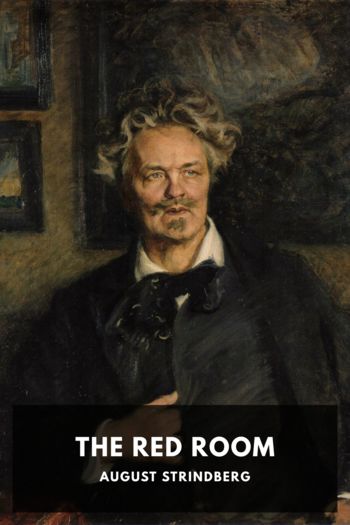The Red Room by August Strindberg (ready player one ebook TXT) 📕

- Author: August Strindberg
Book online «The Red Room by August Strindberg (ready player one ebook TXT) 📕». Author August Strindberg
Andersson was disturbed in his reading by two or three boys who were standing in the doorway, asking the price of the fishing-rods. Looking out into the street he caught sight of our Mr. Arvid Falk. Falk had lent him the book, so that it could safely be left on the counter; and as his former playfellow entered the shop, he greeted him familiarly, with a knowing look.
“Is he upstairs?” asked Falk, not without a certain uneasiness.
“He’s at breakfast,” replied Andersson, pointing to the ceiling.
A chair was pushed back on the floor above their heads.
“He’s got up from the table now, Mr. Arvid.”
Both young men seemed familiar with the noise and its purport. Heavy, creaking footsteps crossed the floor, apparently in all directions, and a subdued murmur penetrated through the ceiling to the listeners below.
“Was he at home last night?” asked Falk.
“No, he was out.”
“With friends or acquaintances?”
“Acquaintances.”
“Did he come home late?”
“Very late.”
“Do you think he’ll be coming down soon, Andersson? I don’t want to go upstairs on account of my sister-in-law.”
“He’ll be here directly; I can tell by his footsteps.”
A door slammed upstairs; they looked at each other significantly. Arvid made a movement towards the door, but pulled himself together.
A few moments later they heard sounds in the countinghouse. A violent cough shook the little room and then came the well-known footsteps, saying: stamp—stamp, stamp—stamp!
Arvid went behind the counter and knocked at the door of the countinghouse.
“Come in!”
He stood before his brother, a man of forty who looked his age. He was fifteen years older than Arvid, and for that and other reasons he had accustomed himself to look upon his younger brother as a boy towards whom he acted as a father. He had fair hair, a fair moustache, fair eyebrows, and eyelashes. He was rather stout, and that was the reason why his boots always creaked; they groaned under the weight of his thickset figure.
“Oh, it’s only you?” he said with good-natured contempt. This attitude of mind was typical of the man; he was never angry with those who for some reason or other could be considered his inferiors; he despised them. But his face expressed disappointment; he had expected a more satisfactory subject for an outburst; his brother was shy and modest, and never offered resistance if he could possibly help it.
“I hope I’m not inconveniencing you, brother Charles?” asked Arvid, standing on the threshold. This humble question disposed the brother to show benevolence. He helped himself to a cigar from his big, embroidered leather cigar-case, offering his brother a smoke from a box which stood near the fireplace; that boxful—visitors’ cigars, as he frankly called them, and he was of a candid disposition—had been through a shipwreck, which made them interesting, but did not improve them, and a sale by auction on the strand, which had made them very cheap.
“Well, what is it you want?” asked Charles Nicholas, lighting his cigar, and absentmindedly putting the match into his pocket—he could only concentrate his thoughts on one spot inside a not very large circumference; his tailor could have expressed the size of it in inches after measuring him round the stomach.
“I want to talk business with you,” answered Arvid, fingering his unlighted cigar.
“Sit down!” commanded the brother.
It was customary with him to ask people to sit down whenever he intended to take them to task; he had them under him, then, and it was more easy to crush them—if necessary.
“Business? Are we doing business together?” he began. “I don’t know anything about it. Are you doing business? Are you?”
“I only meant to say that I should like to know whether there’s anything more coming to me?”
“What, may I ask? Do you mean money?” said Charles Nicholas, jestingly, allowing his brother to enjoy the scent of his good cigar. As the reply, which he did not want, was not forthcoming, he went on:
“Coming to you? Haven’t you received everything due to you? Haven’t you yourself receipted the account for the Court of Wards? Haven’t I kept and clothed you since—to be strictly correct, haven’t I made you a loan, according to your own wish, to be paid back when you are able to do so? I’ve put it all down, in readiness for the day when you will be earning your livelihood, a thing which you’ve not done yet.”
“I’m going to do it now, and that’s why I’m here. I wanted to know whether there’s still anything owing to me, or whether I am in debt.”
The brother cast a penetrating look at his victim, wondering whether he had any mental reservations. His creaking boots began stamping the floor on a diagonal line between spittoon and umbrella-stand; the trinkets on his watch-chain tinkled, a warning to people not to cross his way; the smoke of his cigar rose and lay in long, ominous clouds, portentous of a thunderstorm, between tiled stove and door. He paced up and down the room furiously, his head bowed,





Comments (0)